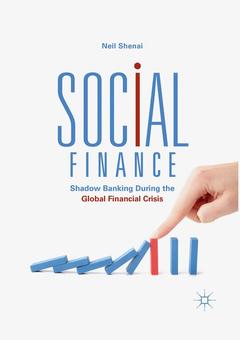Social Finance, Softcover reprint of the original 1st ed. 2018 Shadow Banking During the Global Financial Crisis
Auteur : Shenai Neil

How do market participants construct stable markets? Why do crises that seem inevitable after-the-fact routinely take market participants by surprise? What forces trigger financial panics, and why does uncertainty lead to market volatility? How do economic elites respond to financial distress, and why are some regulatory interventions more effective than others? Social Finance: Shadow Banking during the Global Financial Crisis answers these questions by presenting a new, economic conventions-based model of financial crises. This model emerges from a theoretical synthesis of several intellectual traditions, including Keynesian epistemology, Hyman Minsky?s asset market theory, economic sociology, and international relations theory. Social Finance uses this new paradigm to explain instability in the global shadow banking system during the global financial crisis. And it presents the results of interviews with some of the world?s leading investors ? who saw over $2 trillion in annual order flows and managed over $160 billion in assets ? to provide first-hand accounts of markets in crisis. Written in accessible prose, Social Finance will appeal to a broad audience of academics, policymakers, and practitioners interested in understanding the drivers of financial stability in the twenty-first century.
Chapter 1. McCulley’s Warning: Minsky, Economic Conventions, and Shadow Banking.- Chapter 2. Economic Conventions and Financial Crises: The Theory of Social Finance.- Chapter 3. Federal Reserve Monetary Policy, Economic Conventions, and the Housing Bubble.- Chapter 4. The Rise of Fragile Finance: Conventional Expectations, Bond Ratings, and Bank Capital.- Chapter 5. Regulators as Liquidity Providers of Last Resort.- Chapter 6. Markets After Lehman: Convention Uncertainty, Instability, and Intervention.- Chapter 7. Conclusions and Extensions of Conventions and Financial Stability.- Interview appendix.
Neil Shenai was a Professorial Lecturer at American University’s School of International Service in Washington, DC from 2013-15. He received his PhD from Johns Hopkins University School of Advanced International Studies, where he served as an Adjunct Lecturer of International Economics from 2011-16. He is currently a Term Member of the Council on Foreign Relations.
Advances a new theory of financial crises based on economic conventions
Illustrates the utility of this conventions-based model via a case study of shadow banking during the global financial crisis
Explains how shadow banks facilitate credit, liquidity, and maturity transformation outside of the traditional banking system
Presents the results of interviews with securities dealers, hedge fund managers, private equity investors, and regulators who oversaw $2 trillion in notional order flows and managed over $160 billion in assets during the global financial crisis
Date de parution : 01-2019
Ouvrage de 231 p.
14.8x21 cm
Disponible chez l'éditeur (délai d'approvisionnement : 15 jours).
Prix indicatif 29,53 €
Ajouter au panierDate de parution : 10-2018
Ouvrage de 231 p.
14.8x21 cm



